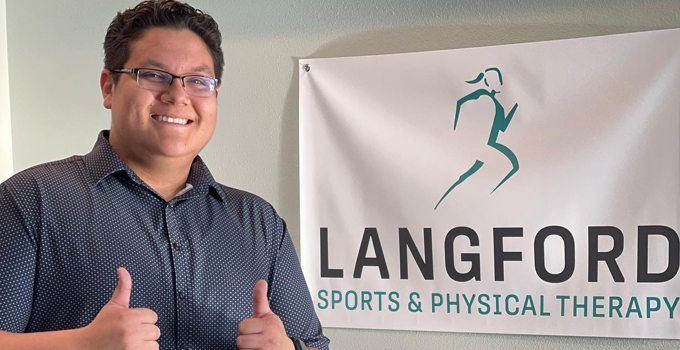Jacob Villalobos, recent graduate from the Bachelor of Science in Population Health (BSPH) Program with a minor in Psychology and then chose to pursue the Doctor of Physical Therapy (DPT) program.
Choosing a BSPH from the College of Population Health was helpful, he said, because he valued the different perspective it provided for a career in physical therapy.
Most students who enter the program major in exercise science, and while that can give a lot of familiarity with the anatomy of a person, Villalobos wanted to be able to have a perspective of what is affecting the patient based on their surroundings or environmental factors. Furthermore, he also chose to minor in psychology to be able to put himself in the patient’s mindset.
“How are they feeling? What would they want to hear right now? Having a sense of empathy is important when working with patients and being able to understand the psychology behind it can be very helpful,” Villalobos said.
Villalobos’ future career plans involve being a physical therapist and giving back to the community.
“I see people all around me with physical ailments, including friends and family, and all I ever wanted to do was help them get through that pain, so that is an important part of what I want to do in the future,” Villalobos said.Bringing a different perspective to the career field helps providers give better care by looking at the factors that could be affecting a patient, and not just at the point of pain. For example, if a patient reports having constant pain in their legs, which prevents them from walking very far, instead of immediately giving them exercises, Villalobos wants to assess how far they need to walk every day, what mobility options they have, as well as better understanding what environmental factors might be causing or exacerbating the pain. Questions like these can help the provider better understand a patient’s situation and, so, provide better care.
While any bachelor’s degree fulfills the requirement for the DPT program, the BSPH can provide students with a strong foundation of knowledge and skills that can be beneficial for any potential career. Specifically, the DPT program benefits from the BSPH coursework, which includes foundational knowledge on public health, basic sciences, research methods, statistics, and communication skills which are all relevant to physical therapy. Understanding the broader context of healthcare, having a solid foundation in basic sciences, developing research skills, and honing effective communication skills are all important aspects of being a successful physical therapist.
Villalobos’ advice to those who are interested in following this same path are to research the programs, maintain a high GPA, gain clinical experience, observe at as many different locations as possible, build relationships and networking skills, while also preparing for the GRE. Maintain a high GPA and take difficult courses such as anatomy, physiology, physics, and chemistry as they are all going to affect your academic performance.
- Gain clinical experience in as many physical therapy settings, as this is also valuable for the application process.
- Network with faculty members, healthcare professionals and front desk staff as this can help merit potential mentorships and opportunities in the field.
- Prepare for the Graduate Record Exam (GRE) which can be a real hurdle for many students. Register for a GRE test prep program at UNM and make use of the practice question books as provided.
“I think overall, the best advice I could give is to not be afraid to ask for help throughout this process. It is a lot, and at times you may doubt your decisions, but once you get through it all, you will feel accomplished and know that what you endured and worked for is worth it for the experience you gained and the connections you made.”
